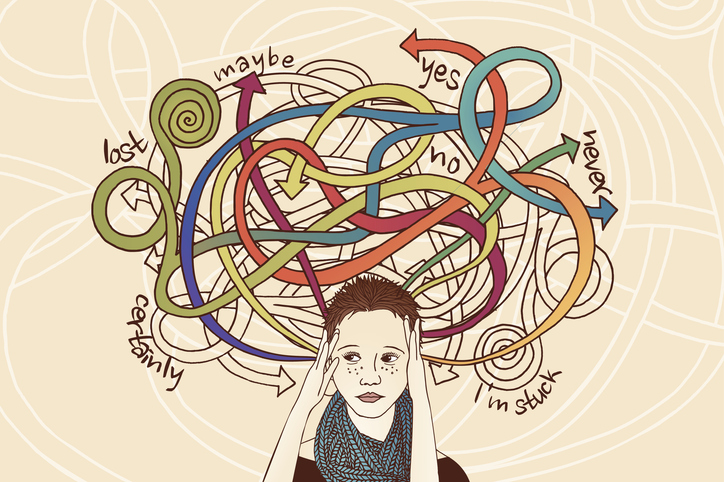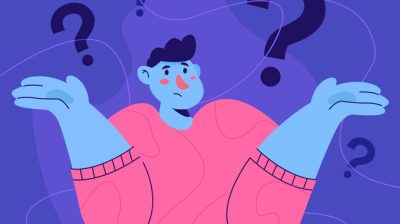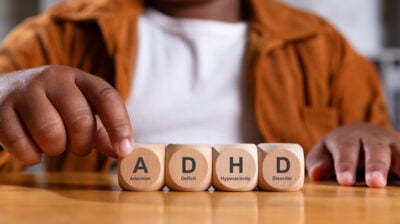What are my ADHD treatment options?
Discover how tailored strategies, including talk therapies and healthy lifestyle habits, can make a meaningful difference in daily life.

In this factsheet, you will find information on ADHD treatment options, including:
ADHD medication
Talk therapies for ADHD
Lifestyle changes to improve ADHD symptoms
If you’d like to find out more information about ADHD, read our factsheets on the signs and symptoms of ADHD and how to get assessed.
What are the benefits of getting ADHD treatment?
There is no “cure” for ADHD, and treatment usually doesn’t completely remove symptoms. However, finding appropriate treatments can help people with ADHD manage their symptoms and improve their lives in many ways.
Research has shown that people who get treatment for ADHD tend to have:
- Higher levels of academic achievement
- Better listening skills
- A greater number and quality of close relationships
- Higher self-esteem in adulthood
- Less family conflict and more meaningful interactions with their parents
- Lower risk of substance misuse, nicotine addiction, and alcohol misuse
- Higher work quality and efficiency, as well as increased job stability
- Higher income
- More insight into future life goals
- Lower rates of speeding, car accidents and criminal behaviour
What is the best ADHD treatment?
ADHD treatment generally involves medication, therapy or a combination of both. In general, research shows that a combination of both the right medication and psychological therapies, such as cognitive behavioural therapy (CBT) or social skills training, is more effective long-term than either treatment option on its own. However, what works best for each individual can vary, and treatment options should be tailored to a person’s needs, circumstances and severity of ADHD symptoms. If you’re in any doubt about the potential risks or benefits of a treatment, it is best to talk to your doctor or other appropriate medical professional.
ADHD medication
Although psychologists, psychiatrists, and paediatricians can diagnose ADHD, only psychiatrists and paediatricians can prescribe medications. The medications commonly prescribed for ADHD are stimulants and non-stimulants, and these are started on a trial basis, where the balance of positive and negative effects for each individual are taken into account. If you start taking a new medication for ADHD, you will have regular check-ups where a medical professional reviews the dose, type of medication, and any side effects you may be experiencing. This will help you figure out if the medication is the right one for you.
Each type of ADHD medication, including stimulants and non-stimulants, affects the body in different ways. If you’re taking medication, it’s important to be closely monitored by a doctor to ensure it’s working safely and effectively.
Stimulant medications
Stimulant medications can improve a person’s motivation and ability to pay attention by increasing the levels of two chemicals in the brain called dopamine and norepinephrine. In Ireland, methylphenidate and lisdexamfetamine are the two stimulant medications most commonly prescribed for ADHD. Methylphenidate is available in immediate release (“Medikinet IR” or “Ritalin IR”, lasting 4 hours) and in slow or prolonged release (“Medikinet MR”/ “Ritalin LA” / “Equasym XL”/ “Concerta XL”, lasting 8-12 hours) forms. Lisdexamfetamine (“Tyvense”) has similar effects and can be used when a person does not respond well to methylphenidate.
Non-stimulant medications
Non-stimulant medications improve levels of attention and focus by increasing levels of the brain chemical norepinephrine. Doctors prescribe non-stimulants when a person with ADHD also has other conditions, like a tic disorder, that need to be managed, or when a person tried stimulants before and they didn’t help or caused negative side-effects. Non-stimulant medicines include atomoxetine (“Strattera”) and guanfacine (“Intuniv”).
Psychiatrists can prescribe “third-line” medications if a person doesn’t respond well to the stimulant or non-stimulant medications mentioned. If you would like to know more about your medication options, it is best to speak to your doctor or prescribing professional.
Antidepressants
Some individuals with ADHD may be prescribed an antidepressant to treat symptoms of anxiety or depression. Serotonin reuptake inhibitors (SSRIs)—the most commonly prescribed antidepressants—have not been shown to improve ADHD symptoms specifically. However, they can be helpful in combination with stimulant or non-stimulant medications for treating co-occurring mental health difficulties, such as anxiety or depression.
Side effects
Whether taking stimulant or anti-stimulant medications, it’s important to be aware that you may experience some unwanted side effects. Side effects common to both stimulant and non-stimulant medications are:
- Changes in appetite
- Changes in weight
- Sleep difficulties
- Increase in anxiety or depression
- Nausea and/or vomiting
- Changes in blood pressure and heart rate
Therapy for ADHD
Not everyone wants to use medication to manage their ADHD symptoms, and that’s OK. Since many of the most commonly prescribed ADHD medications don’t stay in your system for long, they do not have a long-lasting effect on symptoms. This is why it’s important to take ADHD medications regularly and consistently.
A variety of talk therapies can help manage symptoms of ADHD, both in combination with medications and as stand-alone treatments. Commonly recommended therapies include different types of psychotherapy (including CBT) and social skills training, as well as behaviour therapy and parent training and education programmes specific to children and teenagers.
Behaviour therapy
Professionals offer behaviour therapy to parents or guardians supporting children with ADHD at home and at school. The basic principle of behaviour therapy is that a guardian or teacher rewards children with ADHD for behaviours that help them to better learn, work, and socialise, thereby promoting more of these behaviours (positive reinforcement). Guardians and teachers may highlight the negative effects of more challenging behaviours, thereby discouraging these actions.
Parents and educators of children and teenagers with ADHD can learn behaviour therapy techniques through parent training and education programmes.
Psychotherapy and CBT
In psychotherapy, a therapist may support a person with ADHD to manage difficult emotions stemming from the strain of managing relationships and work or school responsibilities with ADHD symptoms. Learn more about the different types of psychotherapy and their potential benefits.
Psychotherapists may also help the individual to develop more effective ways of coping with negative feedback, managing their feelings during difficult interactions, and avoiding emotional outbursts. Psychologists generally describe skills that help people to deal with difficult emotions in a healthy way as emotional regulation skills. Psychologists also help with developing strategies to manage the cognitive, social, and behavioural symptoms of ADHD.
CBT is a particular type of psychotherapy that can be helpful for people with ADHD. People with ADHD can face setbacks in education, work, and other areas of life, especially without the appropriate supports. CBT can help by addressing demoralising beliefs and reframing self-critical thoughts that often arise in response to these setbacks. This, in turn, can help a person to foster a more positive view of themselves and the world they live in. CBT can also help people develop practical strategies for coping with everyday challenges, such as planning, time management, and organisation.
Read more about CBT and how it works.
Social skills training
Both children and adults with ADHD can benefit from social skills training, in which they learn coping strategies for dealing with challenging social situations, as well as everyday interactions at work, school, or at home with family. For some people with ADHD, learning how to communicate, take constructive feedback, and actively listen to others can improve the quality of their relationships.
ADHD lifestyle changes
In addition to treatment options like medication and various talk therapies, lifestyle changes can help people with ADHD manage some of their symptoms. Changes like improving your diet, sleep habits, and/or increasing the amount you exercise each week is beneficial. While it is important to recognise that changing your lifestyle is not a cure for ADHD, these changes can help to support your overall mental and physical wellbeing.
Healthy exercise and sleep habits improve emotional regulation or your ability to manage and respond to your emotions in a healthy way. These positive habits can also help maintain and improve cognitive functioning skills. Cognitive functioning refers to the mental processes used for thinking, learning, problem-solving, and decision-making.
Diet and ADHD
You may be wondering if there are certain foods that people with ADHD should avoid. There are no hard-and-fast rules when it comes to managing a person’s diet. Keeping a food diary may help you to identify particular food sensitivities. You can also find out whether there appear to be links between eating certain foods and feeling hyperactive. Some individuals with hyperactivity may benefit from reducing their intake of foods or drinks, like caffeine, that can increase their symptoms. Caffeine can interact with a person’s ADHD medications, leading to unwanted side effects like restlessness and anxiety.
Research has shown that sugar can worsen ADHD symptoms. Foods rich in protein, like lean beef, pork, poultry, fish, eggs, beans, and nuts, can help improve ADHD symptoms. There is some evidence that fish oil can help with some ADHD symptoms.
Some people may have a history of disordered eating or reduced appetite due to medication. They might also have a tendency to skip meals or become dehydrated due to difficulties self-monitoring. For this reason, it is best to consult a medical professional if you are thinking about making any dietary changes. If you’re in doubt, consider focusing on other lifestyle changes or coping methods that carry less risk of triggering unhealthy eating behaviours.
Exercise and ADHD
Getting exercise, where possible, can help people with ADHD manage unwanted feelings of restlessness or hyperactivity throughout the day. Adding exercise to your routine can help people with ADHD improve their ability to concentrate. This might include taking regular breaks at work where you go outside or get your body moving, or getting a standing desk, which gives you the option of alternating standing and sitting while you work. Studies suggest that movement breaks (that do not involve screen time) have a positive effect on concentration and focus. You might also find it helpful to develop a more vigorous exercise routine outside of school or work or play a sport you enjoy regularly.
While exercising more can help you manage certain ADHD symptoms, exercising late in the day can interfere with getting a good night’s sleep for some people.
To find support groups and resources while managing ADHD, visit the ADHD Ireland website.
Feeling overwhelmed and want to talk to someone?
- Get anonymous support 24/7 with our text message support service
- Connect with a trained volunteer who will listen to you, and help you to move forward feeling better
- Whatsapp us now or free-text SPUNOUT to 50808 to begin.
- Find out more about our text message support service
If you are a customer of the 48 or An Post network or cannot get through using the ‘50808’ short code please text HELLO to 086 1800 280 (standard message rates may apply). Some smaller networks do not support short codes like ‘50808’.






